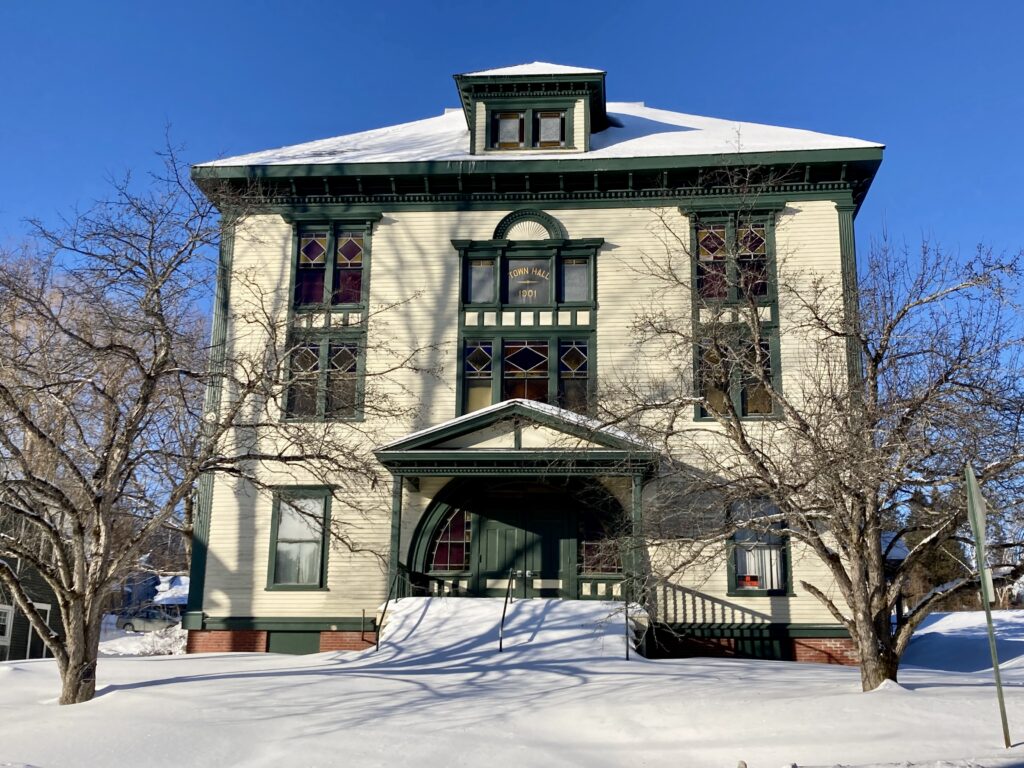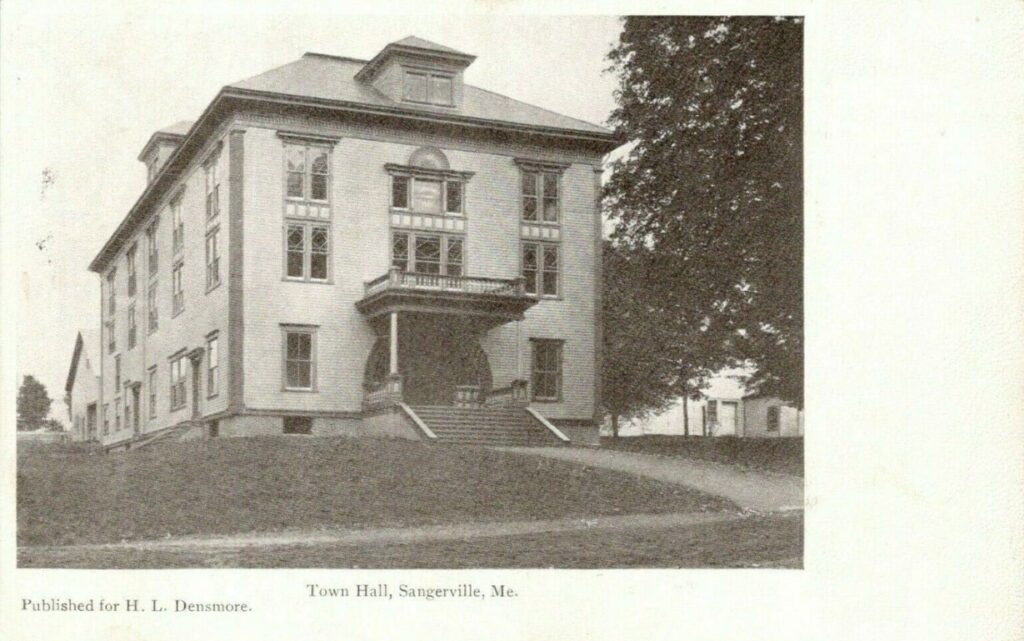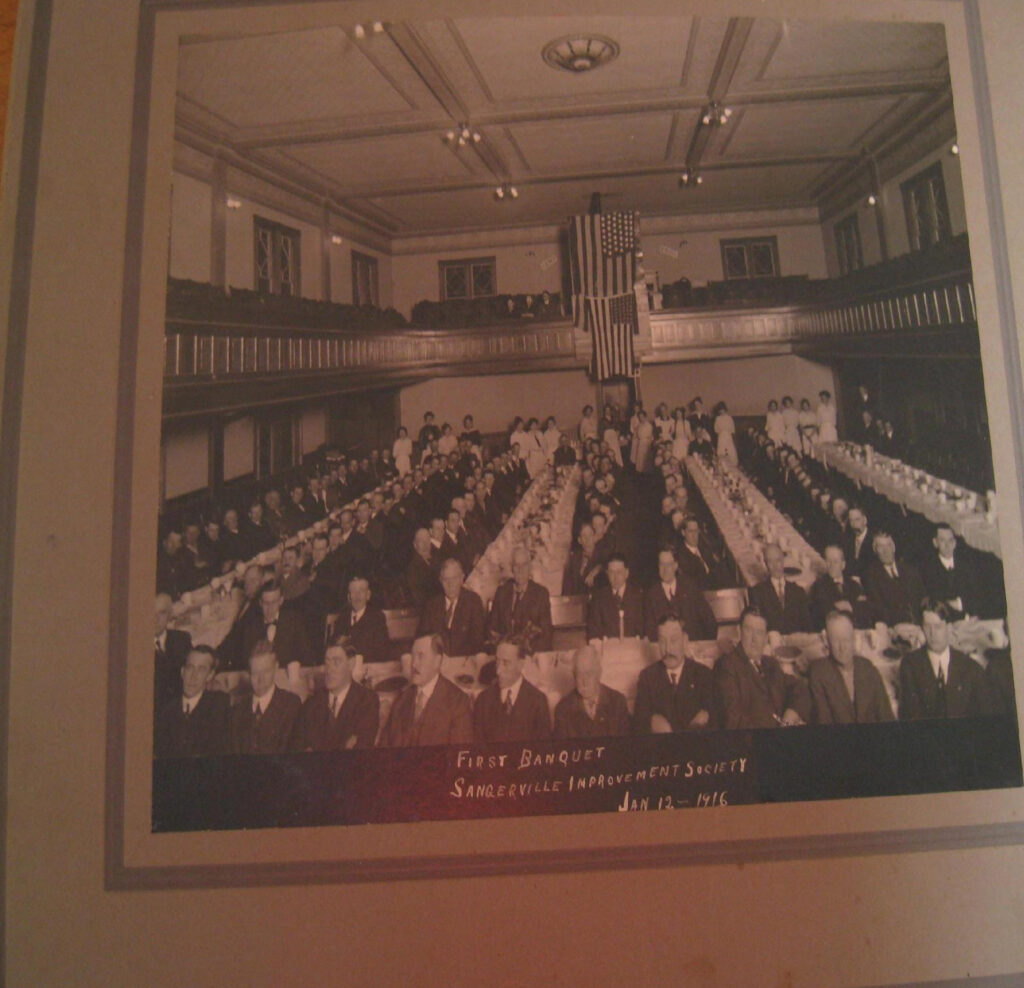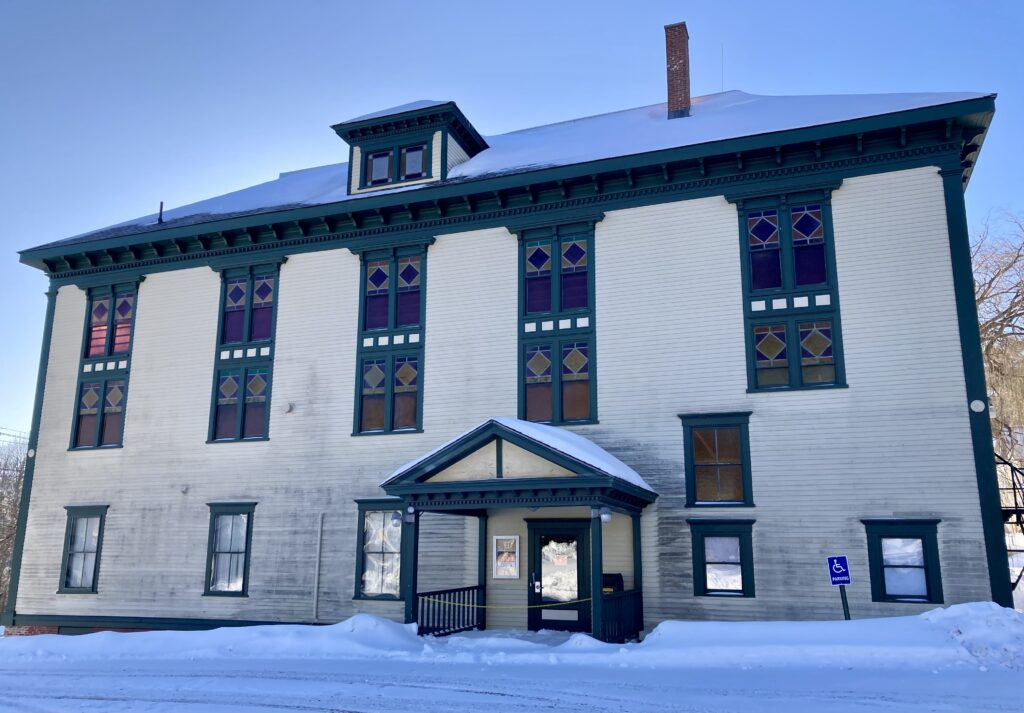
Sangerville struggling to determine fate of century-old town hall building
SANGERVILLE — Some of Sangerville’s 1,300 residents say their historic town hall, built in 1901 and known for its striking stained glass windows, captures the town’s character and should be saved. The town leaders, who until recently housed the municipal office in the building, just want a less costly and more efficient space.
A “no trespassing” sign hangs in a window on the bottom right portion of the old structure, and a yellow chain blocks what used to be the municipal building entrance. The town hall is no longer insured or open to the public after inspections found issues with the building, primarily its foundation.
The town manager and deputy clerk work from a temporary space on Main Street while the Sangerville Select Board considers its options.

TOWN HALL — Sangerville’s historic town hall, built in 1901, is pictured Feb. 1,
Over the years, Sangerville’s masonic lodge, American legion hall, the Abbie Fowler School, the Catholic church and other places have closed, said Diana Bowley, Sangerville Historical Society president. Most recently, the public library folded and A.E. Robinson went out of business. All of those places contributed to the town’s character.
Sangerville town officials will need to decide the town hall’s fate based on finances and have said they’re looking for a solution that doesn’t burden taxpayers, which likely means the historic building will be left behind. But advocates for saving the building argue it would preserve Sangerville’s identity, which has been slowly eroding, and keep it from becoming an unremarkable pass-through town.
Sangerville’s dilemma illustrates how small, rural Maine towns that have lost the industry they were built around struggle to thrive, or even maintain an identity. In Sangerville, that identity was ruled by textile production.
“The building represents the pinnacle of Sangerville’s history as a booming industrial town,” Bowley said. “We just feel that it’s a historic asset. We’ve got nothing else [historic] other than the privately owned Universalist church.”

TOWN MANAGER — Sangerville Town Manager Lorna Bell works in the temporary municipal office at 93 Main St. on Wednesday.
In March 1901, Sangerville residents voted to build the town hall and dedicate it to “the promotion of citizenship, patriotism and wholesome pleasure,” Bowley said. It cost about $12,000 to construct the building with two stories and a cellar, birch flooring, cypress doors and other special features.
Performers from across the country held concerts and shows on the stage upstairs, she said. Dances, graduations, public suppers, basketball games, town meetings and more were held there over the years.
The town hall, listed on the National Register of Historic Places in 1991, was in jeopardy of being abandoned once before. In the early 1990s, residents voted to allocate funds for renovations, which cost about $416,000 and involved some grants, Bowley said.
The architectural gem can be rescued again, she said.

EARLY 20TH CENTURY — Sangerville Town Hall is pictured in the early 1900s.
Jerry Peters, a Sangerville resident of 50-something years, led the restoration committee behind town hall renovations in 1992-93. The building is well worth saving, he said.
“It gives us a sense of place. We’ve lost a lot in Sangerville,” he said.
Lorna Bell, who has been the town manager since November 2021, said it doesn’t make sense to continue operating such a large building, especially with recent usage declining and the library, which was housed there, being gone.
The town pays $1,300 a month to rent its temporary space, and with today’s fuel prices, it would cost more just for fuel in the town hall, she said.

IMPROVEMENT SOCIETY — Members of the Sangerville Improvement Society are pictured at the town hall in 1916.
In some ways, Sangerville already is a drive-thru town, Bell said, because once thriving mills and industries have evaporated. Times and technology have changed, and communities aren’t as attached to their municipal centers as they were decades ago, she said.
“This is an older community,” she said. “Most of the people live on a subsidized income. That building is absolutely beautiful, but we don’t need a lot of space. It’s not financially responsible for the town to take on this burden of maintaining the building.”
In 2019, repairs to the foundation were estimated to cost between $200,000 and $300,000, Bell said. Select Board Chairperson Mike Wark said an engineer recently estimated it would cost $400,000-600,000, which doesn’t include replacing the roof and other necessities, she said.
Select Board members are considering different options for its municipal office, including building a smaller, more energy-efficient space and renovating the public works garage that is mostly used for storage, Wark said. The town no longer has a public works department.

HISTORIC BUILDING — Sangerville’s historic town hall, built in 1901, is pictured Wednesday, Feb. 1.
Historical society members are disappointed that the board has reduced the building’s fate to a purely financial decision, they said in a statement shared on Facebook in November 2022.
“They seem to have disregarded its significance as the centerpiece of the village, a centralized place for municipal government and a potential venue for public and private functions,” they said.
The group has limited funds to take on a restoration project alone, but it has asked town officials to form a committee to study how the building could be rehabilitated, get a second opinion on the cost of repairs and consider grants and other funding sources.
Select Board members have said that a nonprofit has a better chance of acquiring funds and could pursue a project like Central Hall Commons in Dover-Foxcroft, which took almost 10 years to complete and a great deal of fundraising.
Society members want taxpayer money to be invested in the town hall rather than a nondescript building that has little meaning to Sangerville, Bowley said. Acknowledging that residents may disagree, she said that most importantly, the process should involve the public, but town officials quickly decided against any path that would restore the building.
The board discusses the matter at nearly every meeting, and anyone is welcome to attend, weigh in and ask questions, Wark said. Any decision related to the town hall or municipal office must go on a warrant, which is then discussed and voted on during a town meeting, he said.
“There is no shortage of beautiful old buildings in Sangerville, and many of them are in disrepair,” he said. “I understand that people get emotionally attached to these pieces of architecture, and they’re pretty neat. But that’s a different aspect of the story.”
It comes down to Sangerville needing to effectively run its government in a space that isn’t overly complicated, Wark said. Making a meaningful difference in the town hall would cost several millions of dollars, he said.
Sangerville residents should have more information during the annual town meeting in March, though a date has not yet been set.